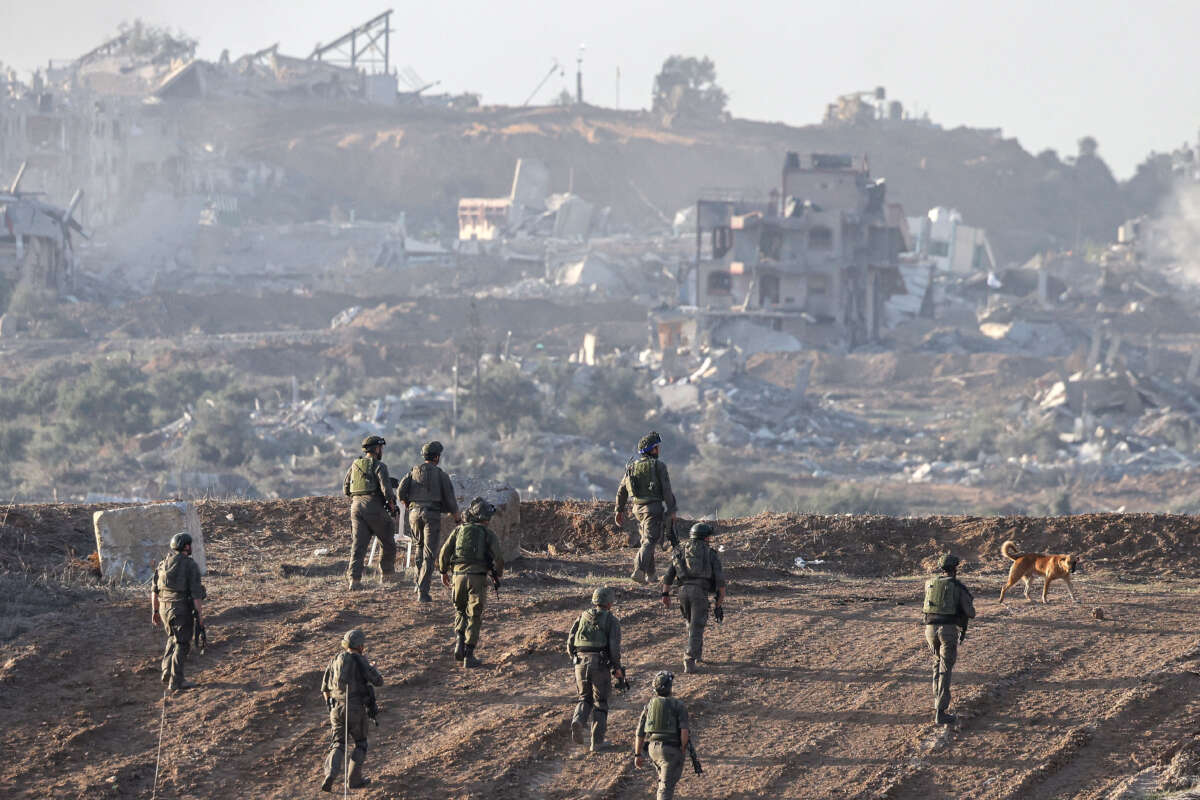Support justice-driven, accurate and transparent news — make a quick donation to Truthout today!
The three Israeli hostages who Israeli soldiers shot and killed last week had waved a white flag before they were killed, the Israeli Defense Forces (IDF) said on Saturday.
Three Israeli hostages were shirtless, carrying a makeshift white flag and traveling together near an IDF base in northern Gaza when soldiers identified them as “terrorists,” an IDF official said. Soldiers immediately opened fire, killing two of them immediately.
The third hostage took shelter in a nearby building and called for help in Hebrew. The commander of the battalion issued a ceasefire order, the official said, but soldiers opened fire on him nonetheless, killing him.
According to Ynet, soldiers only further examined the dead bodies because of their “western appearance” — one of the hostages killed had pale skin and red hair, unlike the majority of Palestinians.
Many advocates for Palestinian rights have pointed to the incident as evidence of IDF soldiers’ willingness to kill civilians without hesitation. It is a war crime to kill civilians indiscriminately in war.
The Israeli military chief of staff, Lieutenant General Herzi Halevi, said it is against the Israeli military’s protocol to shoot at people waving white flags. However, Israel has a long history of doing so; a Human Rights Watch investigation of the 2008 to 2009 Gaza War found that Israeli soldiers killed numerous Palestinians who were holding white flags, including children. Meanwhile, there is mounting evidence from the current massacre of Gaza and from decades past that Israeli forces routinely kill civilians, either mistakenly or on purpose, with impunity.
“Under the laws of war, people are presumed to be civilians,” Sari Bashi, Human Rights Watch program director, told The New York Times. “There needs to be strong information to suggest they are not before you can kill them.” Bashi pointed out that Israel opened fire on the hostages nearly immediately, and that they were only concerned with the fact that they had killed civilians because they were Israeli.
Meanwhile, the Israeli military has been especially reckless in their current assault of Gaza: Yagil Levy, an expert on civil-military studies at the Open University of Israel, told The Times that the “friendly fire” rate among Israeli soldiers is at an “unprecedented” level, with an estimated 20 percent of killings of Israeli soldiers being done by fellow IDF members so far.
Families of other hostages who have been detained by Hamas forces have said that the deaths only further their beliefs that Israel’s military should stop bombing Gaza and focus on hostage negotiations.
“Let them free all the Palestinian prisoners we have here, all the terrorists — what do I care,” Itzik Horn, whose adult sons were abducted by Hamas, told The New York Times, referring to the thousands of Palestinians who are being jailed by Israel, many without formal charges. “The most important thing isn’t to defeat Hamas. The only victory here is to bring back all the hostages.”
Adam Yekutieli, a 37-year-old artist who attended a protest in Tel Aviv on Friday calling for more discussions on the release of the hostages in response to the killings, told NPR that the incident reinforced his support for another negotiated ceasefire. “There’s no military solution to this situation,” he said. “Israel is bombing its way into a corner that it won’t be able to get out of.”
A terrifying moment. We appeal for your support.
In the last weeks, we have witnessed an authoritarian assault on communities in Minnesota and across the nation.
The need for truthful, grassroots reporting is urgent at this cataclysmic historical moment. Yet, Trump-aligned billionaires and other allies have taken over many legacy media outlets — the culmination of a decades-long campaign to place control of the narrative into the hands of the political right.
We refuse to let Trump’s blatant propaganda machine go unchecked. Untethered to corporate ownership or advertisers, Truthout remains fearless in our reporting and our determination to use journalism as a tool for justice.
But we need your help just to fund our basic expenses. Over 80 percent of Truthout’s funding comes from small individual donations from our community of readers, and over a third of our total budget is supported by recurring monthly donors.
Truthout has launched a fundraiser to add 432 new monthly donors in the next 7 days. Whether you can make a small monthly donation or a larger one-time gift, Truthout only works with your support.
